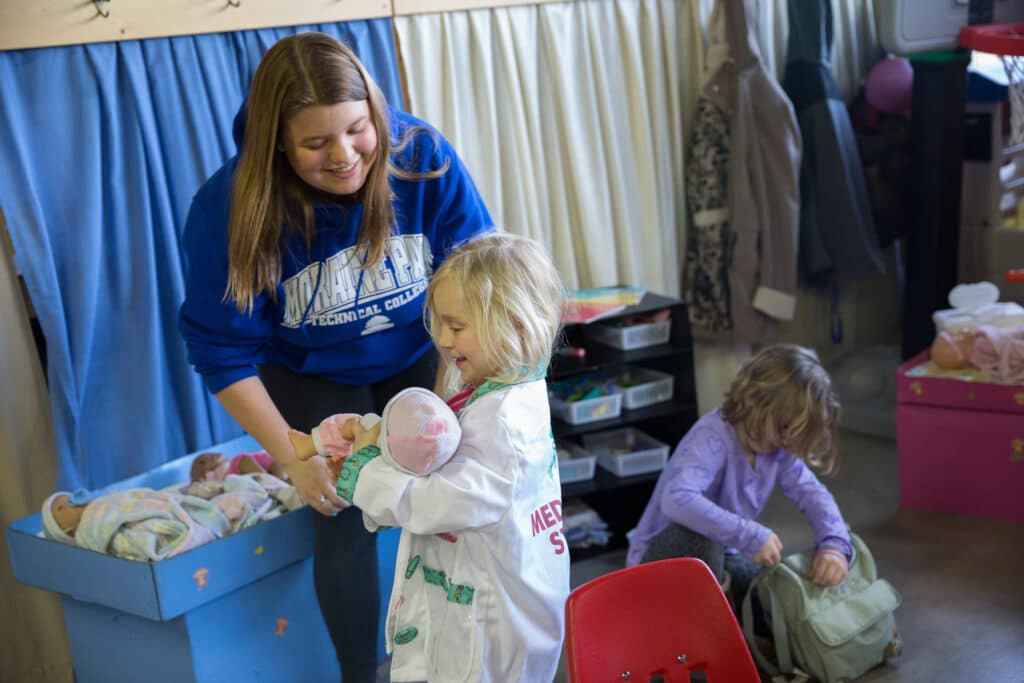Apprenticeship│24 Credits│Fond du Lac, West Bend
Early Childhood Educator Apprenticeship
Begin your journey and gain hands-on, on-the-job training to learn how to become an early childhood educator.
The Early Childhood Educator apprenticeship program at Moraine Park prepares students for their journey as educators, setting the stage for graduates to work as teachers and caregivers. Apprentices gain hands-on classroom instruction and on-the-job training to learn how to become an early childhood educator. During the apprenticeship program, participants work alongside experienced educators to grow in their trade.

What You’ll Learn
Students in the Early Childhood Educator apprenticeship learn to care for and educate children while playing a key role in children’s development. Graduates will know how to maintain a clean and safe environment, as well as plan educational activities and assess child growth and progress. Graduates of the program are prepared to work with children from birth to 8-year age range and are well-prepared for a variety of Early Childhood Education jobs.
Program Outcomes
- Maintain a safe environment
- Promote child development
- Promote child nutrition and hygiene
- Guide children’s behavior
- Implement curriculum
- Engage families
- Demonstrate leadership and professionalism
Apprentice students do not complete standard admissions with Moraine Park. Interested students should contact:
Lavelle Gill, Apprenticeship Training Representative
Phone: (262) 340-1143
Email: almonl.gill@dwd.wisconsin.gov
Application Information
Learn more at www.wisconsinapprenticeship.org
Application Requirements
- Apprenticeship application
- Employer application (if sponsored)
- EEOC Supplemental Information Form
- High school verification:
- Transcripts with graduation date listed, or
- Copy of high school diploma, or
- GED/HSED certificate, or
- Graduating senior: verification that you are on track to graduate, or
- Homeschool PI – 1206 form verification for each year completed
- DCF fingerprint-based background check
- TB Test
- Physician cleared to work with children (health report)
Several factors influence the total cost of your degree, including enrollment fees, the number of credits required, and textbooks.
For further details, please visit the estimated cost of attendance page.
Training Period
The apprenticeship consists of 2 years of not less than 4,432 hours (which includes at least 432 hours of related instruction).
The apprentice must:
1. Obtain Infant/Child, AED, First Aid and CPR certification during the first three months of the program and maintain it throughout.
2. Complete DCF certification requirements to provide care to children within the first six months of the program.
3. Register with “The Registry” within the first six months of the program and keep their registration updated.
4. Successfully complete Transition to Trainer in the final year of the program.
High school dual credit provides high school students the opportunity to earn college credit while in high school, without leaving their high school classroom. The courses are taught by certified high school instructors using technical college curriculum, grading policies and textbooks.
Has previous life experience already helped you build knowledge and skills applicable to your studies? Applying previously earned credits to a program of study can save you both time spent in the classroom and money spent on tuition and fees.
Transferring here is easy! You can transfer in prior college work by submitting official college transcripts or get a free transcript review.
Financial Aid is provided to aid eligible associate degree and technical diploma programs with 28 credits or more. Processing can take 6-8 weeks after a student’s completed Free Application for Federal Student Aid (FAFSA) is received.
Financial Aid is available for associate degree and technical diploma programs (those that are 2 semesters in length and typically with 28 credits or more). Processing can take 4-5 weeks after a student’s completed Free Application for Federal Student Aid (FAFSA) is received. Visit the Financial Aid page to learn more.
Our recruiters on any of the three campuses are ready to help you plan your future!

